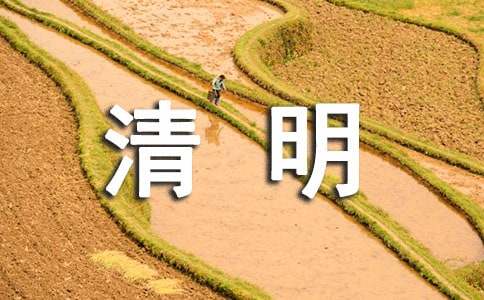- 相关推荐
2017写清明节的英语作文
清明节又叫踏青节,在仲春与暮春之交,也就是冬至后的第108天。下面是小编整理的写清明节的英语作文,希望能帮到大家!

清明节英语作文【1】
In contrast to the sadness of the tomb sweepers, people also enjoy hope of Spring on this day. The Qingming Festival is a time when the sun shines brightly, the trees and grass become green and nature is again lively. Since ancient times, people have followed the custom of Spring outings. At this time tourists are everywhere.
People love to fly kites during the Qingming Festival. Kite flying is actually not limited to the Qingming Festival. Its uniqueness lies in that people fly kites not during the day, but also at night. A string of little lanterns tied onto the kite or the thread look like shining stars, and therefore, are called "god‘s lanterns."
The Qingming Festival is also a time to plant trees, for the survival rate of saplings is high and trees grow fast later. In the past, the Qingming Festival was called "Arbor Day". But since 1979, "Arbor Day" was settled as March 12 according to the Gregorian calendar.
清明节英语作文【2】
Its Chinese name "Qing Ming" literally means "Clear Brightness," hinting at its importance as a celebration of Spring. Similar to the spring festivals of other cultures, Tomb Sweeping Day celebrates the rebirth of nature, while marking the beginning of the planting season and other outdoor activities.
清明节,又叫踏青节,正是春光明媚草木吐绿的时节,也正是人们春游的好时候,所以古人有清明踏青,并开展一系列体育活动的'的习俗。直到今天,清明节祭拜祖先,悼念已逝的亲人的习俗仍很盛行。
清明节英语作文【3】
celebrated two weeks after the vernal equinox, tomb sweeping day is one of the few traditional chinese holidays that follows the solar calendar-- typically falling on april 4, 5, or 6. its chinese name
festivals of other cultures, tomb sweeping day celebrates the rebirth of nature, while marking the beginning of the planting season and other outdoor activities.
qing ming jie in ancient times
in ancient times, people celebrated qing ming jie with dancing, singing, picnics, and kite flying. colored boiled eggs would be
broken to symbolize the opening of life. in the capital, the emperor would plant trees on the palace grounds to celebrate the renewing nature of spring. in the villages, young men and women would court each other.
the tomb sweeping day as celebrated today
with the passing of time, this celebration of life became a day to the honor past ancestors. following folk religion, the chinese believed that the spirits of deceased ancestors looked after the family. sacrifices of food and spirit money could keep them happy, and the family would prosper through good harvests and more children. today, chinese visit their family graves to tend to any
underbrush that has grown. weeds are pulled, and dirt swept away, and the family will set out offerings of food and spirit money. unlike the sacrifices at a family's home altar, the offerings at the tomb
usually consist of dry, bland food. one theory is that since any number of ghosts rome around a grave area, the less appealing food will be consumed by the ancestors, and not be plundered by strangers. honoring ancestors
honoring ancestors begins with proper positioning of a gravesite and coffin. experts in feng shui, or geomancy, determine the quality of land by the surrounding aspects of streams, rivers, trees, hills, and so forth. an area that faces south, with groves of pine trees creates the best flow of cosmic energy required to keep ancestors happy. unfortunately, nowadays, with china's burgeoning population, public cemetaries have quickly surplanted private gravesites. family elders will visit the gravesite at least once a year to tend to the tombs.
while bland food is placed by the tombs on qing ming jie, the chinese regularly provide scrumptious offerings to their ancestors at altar tables in their homes. the food usually consists of chicken, eggs, or other dishes a deceased ancestor was fond of. accompanied by rice, the dishes and eating utensils are carefully arranged so as to bring good luck. sometimes, a family will put burning incense with the offering so as to expedite the transfer of nutritious elements to the ancestors. in some parts of china, the food is then eaten by the entire family.
春分后两周,清明节是为数不多的中国传统节日是公历4月4日,5,或6。它的中文名字
其他文化节,清明节庆祝大自然的重生,同时标志着种植季节和其他户外活动的开始。
古代清明节
在古代,人们庆祝清明节跳舞、唱歌、野餐和放风筝。彩色煮鸡蛋将
打破象征生命的开启。在首都,皇帝会在宫殿的地上种树以庆祝春天的新生。在村子里,年轻男女相互争。
今天的清明节
随着时间的'流逝,这一生命的庆典成为了过去祖先的荣耀。继民间宗教之后,中国人认为死者祖先的精神照顾家庭。牺牲食物和精神财富可以使他们快乐,家庭会通过丰收和更多的孩子繁荣起来。今天,中国人访问他们的家庭坟墓倾向于任何
增长草丛。杂草被拔去,泥土被冲走了,这家人将要奉献食物和精神钱。不像一个家庭的祭坛献祭,在坟墓的祭品
通常由干燥无味的食物组成。一种理论认为,因为有一些鬼魂罗马墓区周围,不太吸引人的食物会被祖先,而不会被陌生人抢劫。尊敬祖先
祭祖始于一个墓地和棺材的正确定位。在风水学上,专家或风水,由周围的溪流,河流,树木,山,方面确定土地质量等。一个地区,坐北朝南,与松树林创造的宇宙能量保存祖先快乐最好的流。不幸的是,如今,随着中国人口的急剧增长,公众的cemetaries很快超越了私人墓地。家里的老人会去墓地每年至少一次去十三陵。
而清淡的食物放在墓前的清明节,中国定期提供美味祭祖先在他们的家中神坛桌子。食物通常由鸡、蛋或其他菜肴组成,而已故的祖先喜欢吃。在米饭的陪同下,菜肴和餐具都被精心安排以带来好运。有时,一家人会把烧香放在一起,以加速营养元素传递给祖先。在中国的一些地方,食物是通过全家人吃。
【写清明节的英语作文】相关文章:
清明节英语单词08-30
大学写人英语作文08-26
描写清明节习俗的英语作文(通用30篇)04-07
中考英语满分作文应该这样写07-31
英语演讲怎么写题目08-27
怎么写短篇英语演讲05-12
做简短演讲的英语怎么写06-20
元旦英语怎么写09-06